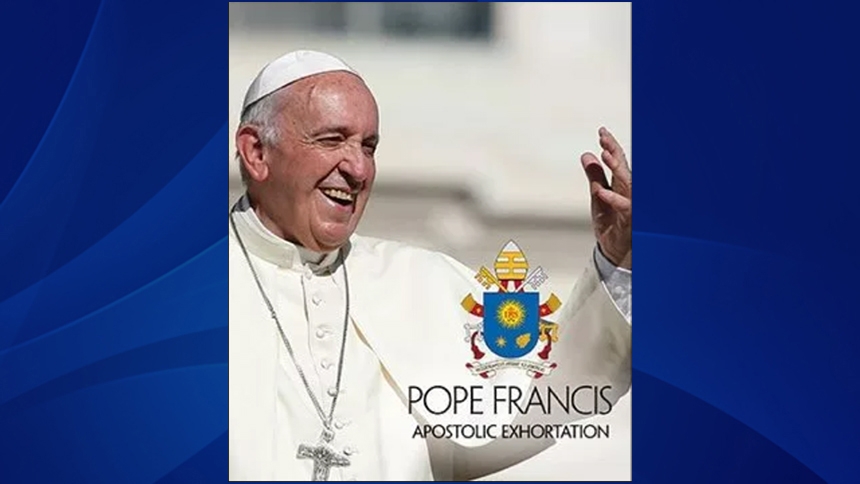
Gaudete et Exsultate: Rejoice and be glad! The call to holiness
Pope Francis’ third and latest apostolic exhortation makes the case for holiness for everyone. With the title drawn from Jesus’ Sermon on the Mount (Mt. 5:12), the document was released in early April.
In the introduction, the Holy Father acknowledges that he wants to re-propose the call to holiness for all in a practical way for our own time, with all its “risks, challenges and opportunities.”
Growing in holiness, each in his or her own way
Through actions great and small, the pontiff says, we can each grow in holiness, encouraging particular attention to the “small gestures” of everyday kindness, patience, prayer and love.
The exhortation, calling on the wisdom of Pope Benedict XVI, states that, “In the end, it is Christ who loves in us; for holiness is nothing other than charity lived to the full.”
Pope Francis warns against a faith that is barren, urging us to allow ourselves to be loved by God, guided by the Holy Spirit, and become the “salt of the earth and the light of the world.”
Gaudete et Exsultate in briefThere are five main themes in the apostolic exhortation: |
Warning against ancient heresies in a modern world
Pope Francis cautions against two heresies that can seduce those on the road to holiness: gnosticism and pelagianism. These heresies lead to “narcissistic and authoritarian elitism, whereby instead of evangelizing, one analyses and classifies others, and instead of opening the door to grace, one exhausts his or her energies in inspecting and verifying.”
Hoping to avoid having the life of the Church becoming “a museum piece or the possession of a select few,” he reminds the faithful of an often overlooked Church teaching, saying the gift of grace “surpasses the power of human intellect and will.”
Jesus Christ: The role model
We needn’t look very far for the perfect role model, the pope says. In the Beatitudes (Mt. 5: 3-12), we find a “portrait of the Master, which we are called to reflect in our daily lives.” Citing St. John Paul II, he calls on all to see Christ in the poor and the suffering.
The Holy Father also cautions against two errors, telling the faithful not to separate the demands of the Gospel from their personal relationship with Christ. He warns us not to become suspicious of the social engagement of others, and not to relativize it, as though the only thing that counts is one’s own favorite issue or cause.
| What is an apostolic exhortation? An apostolic exhortation is a type of communication from the Pope that encourages a community of people to undertake a particular activity, but does not define Church doctrine. An encyclical is a letter which is usually more important than an apostolic exhortation. It usually deals with a specific doctrine, where the doctrine is clarified, or explained in greater detail. |
Community and prayer are at the core
The Holy Father makes it absolutely clear that the devil is real and still prowls about, to “poison us with the venom of hatred, desolation, envy and vice.” Stressing that as an antidote to evil, the call to holiness is best answered from within community, saying, “Growth in holiness is a journey in community, side by side with others.” And “holiness consists in a habitual openness to the transcendent, expressed in prayer and adoration.”
Pope Francis concludes the exhortation with a tribute to the Blessed Mother, because “she lived the Beatitudes of Jesus as none other … She teaches us the way of holiness and she walks ever at our side.”
|
What did the Holy Father say about the equal sacredness of all life? “Our defense of the innocent unborn, for example, needs to be clear, firm and passionate, for at stake is the dignity of a human life, which is always sacred and demands love for each person, regardless of his or her stage of development. Equally sacred, however, are the lives of the poor, those already born, the destitute, the abandoned and the underprivileged, the vulnerable infirm and elderly exposed to covert euthanasia, the victims of human trafficking, new forms of slavery, and every form of rejection. We cannot uphold an ideal of holiness that would ignore injustice in the world where some revel, spend with abandon and live only for the latest consumer goods, even as others look on from afar, living their lives in abject poverty.” |
The Beatitudes: Going against the flow:
In Gaudete et Exsultate, Pope Francis points to the beatitudes as the model we are to follow, even though they run counter to contemporary culture. They are:
Blessed are the poor in spirit, for the reign of God is theirs.
Blessed are the meek, for they will inherit the earth.
Blessed are those who mourn, for they will be comforted.
Blessed are those who hunger and thirst for righteousness, for they will be filled.
Blessed are the merciful, for they will receive mercy.
Blessed are the pure in heart, for they will see God.
Blessed are the peacemakers, for they will be called children of God.
Blessed are those who are persecuted for righteousness’ sake, for there is the kingdom of heaven.
